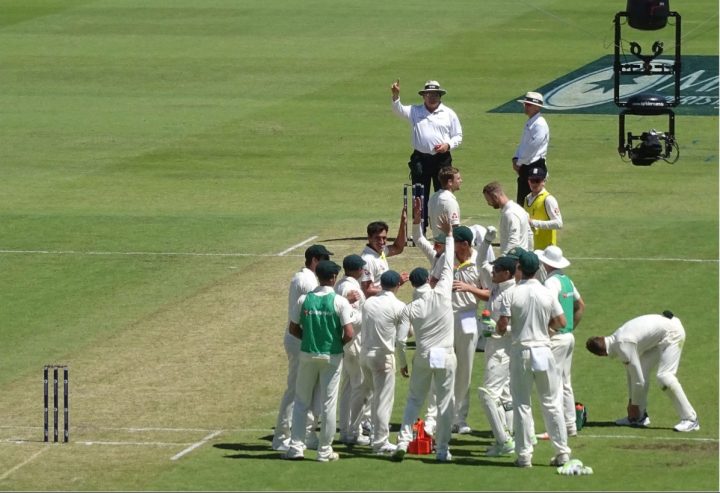Could it be all over today? Will the urn be in Alastair Cook’s mitts by this evening? England have every likelihood of batting on, and on, and on, while Australia will surely bat a little better second time around.But in this series, anything can happen.
Like me, you’re probably still coming to terms with the fact that Australia were bowled out for 60. In the old days of Grandstand’s vide-printer during Final Score, a scoreline involving an unusually large number of goals always had the word written after the number, in brackets, as if to say – yes, really. This machine should have been dusted off yesterday, to shake us out of disbelief.
Australia first innings – 60 all out (SIXTY).
England may have won four of the last six Ashes series, and are about to win this one, but even so, for those of us who endured all the agonies of the years 1989-2002/3, this was an extraordinary moment of catharsis. Sixty. Sixty! Sixty!!
Sixty is a ridiculous score even in a village match. It’s the worst case scenario when a rampant South Africa skewer Bangladesh. Australia weren’t simply embarrassed; this was humiliation on an industrial scale. They forfeited virtually an entire innings.
Yes, Stuart Broad bowled extremely well. Yes, every nick went to hand. Yes, England caught brilliantly. But this was not sixty all-out bowling, nor a sixty all-out pitch. Australia batted as limply, as apologetically, and as amateurishly, as is humanly possible.
This was worse than any England batting disaster during even the most emphatic years of Australian hegemony. We were never this bad, and when we were nearly as bad, we could blame Glenn McGrath and Shane Warne. This wasn’t Ambrose and Walsh wreaking havoc at Perth, Kingston, or Trinidad. Australia were bowled out for 60 by Stuart Broad at Trent Bridge. In 111 balls – the shortest first innings in test history. Michael Clarke had moved himself down to number five to protect himself from the new ball. He ended up facing the ninth ball of the match.
The misery of 2013/14 still abrades the self-esteem of England supporters. Here was recompense. Here was redemption. During those long, dark weeks, I wrote here that Australia’s triumph was a freak, a blip on the graph. The team who were pulverising England comprised largely the same players who had lost to them, with varying degrees of severity, three times in a row.
I didn’t then realise – and in fairness, few did – how bad England had truly become. Not till later did we appreciate the extent to which Andy Flower’s regime had corroded and corrupted itself. Only during the course of 2014 did the scale of England’s fall from grace become fully apparent, although sages wiser than me had spotted the signs of decay as early as 2012.
Had I known then what I know now, I might have analysed 2013-14 in a different way. But then again, given Australia’s travails since Lord’s, perhaps my first instinct was correct. Maybe Australia’s performance in that series was a freak: a convergence of circumstance and player-form which could not be repeated and which masked extensive structural weakness.
During 2013-14, every time Australia chanced their arm, it came off. Warner slashed and hoiked, and found the boundary. But this summer, against a moving ball, positivity has metamorphosed into recklessness.
In 2013-14, England lost Jonathan Trott to illness, Graeme Swann to retirement and Steve Finn to the yips. The captain was runless and emasculated. Their dressing room environment, fuelled by Flower’s paranoid megalomania, collapsed. This summer, Australia have lost Ryan Harris to injury, and Brad Haddin (goodness, didn’t they miss him yesterday), to a combination of form and circumstance. Their captain is even more diminished than Cook was in Australia. Fissures divide the team, and the team from its management. Michael Clarke is at war with his selectors.
This is now officially Australia’s Difficult Summer. Expect them to respond by saying everything is fine, apart from their top run-scorer, the sole cause of their problems. He will then be sacked without explanation, to allow a new team, with a new ethic, to be built around Clarke.
Meanwhile, as day two gets under-way, a few other random observations.
– The Oval, 2009. Durham, 2013. And now Trent Bridge, 2015. This is now the third time in successive home Ashes that a Stuart Broad spell has won the Ashes.
– Jonny Bairstow, once he got in, was excellent. He’s a lovely cricketer, and who can’t be pleased he made the most of his opportunity. But will he ever score a test century?
– Speaking of which, Alastair Cook has now gone twenty seven Ashes innings without a ton. He has never made one at home against Australia, in fourteen tests.
At time of writing, England have recently lost Joe Root and Mark Wood and are now 306-6, leading by 246. Our comments thread on today’s play is already up and running. As always, we’d love you hear your thoughts and views.









I think you’re analysis is a bit off here.
England didn’t lose in Australia because they were suddenly shit. They lost because of an ingrained, systemic shortcoming against high-quality fast bowling in conditions that suited it.
Equally, Australia haven’t suddenly become shit either – despite the epic shut ness of their batting of late. But they looked pretty good at Lord’s, didn’t they? Rather, they’ve been smashed because of ingrained, systemic shortcomings against high-quality seam/swing bowling in conditions that suited it.
The past two Ashes series is not the story of two sides rapidly changing from shit to good or vice versa. Rather, it is the story of two sides who really struggled in unfamiliar conditions. In both series (Lord’s aside), the home side has looked like world beaters while the visitors looked inept. Despite, in both cases, the visitors being favoured pre-series and presenting as stronger on paper.
In other words, Test batsmen ain’t what they used to be.
To be fair Mitchell Johnson bowling in Australia was brutal. England were shell shocked. Once the momentum goes against you it is difficult to get it back.
England got the momentum back pretty easily this series.
Maybe England and Australia need to implement an exchange program for talented players to spend a season or two in the shield or county cricket. Test cricketers should be at least proficient in all conditions. Just saying
That used to be standard. Now we play IPL.
Is there anything more predictable than when something goes wrong for a cricket team someone blames it on T20? One could equally argue (and plenty have) that England’s success (and NZ’s – remember that?) is down to T20 fostering a new, attacking ethos.
Anyway, IPL and T20 can’t be uninvented so teams had better find a way of coping with them.
I have never viewed an Ashes series with less interest. I simply cannot get interested or involved try as I might. To be honest I don’t care who wins. It has also not been a Test series at all. It has stumbled from farce to catastrophe. I may be old fashioned but I like a good fight and a good game and this series has provided neither.
The lack of comments here says it all.
Had to get in a dig at Cook there eh? You act as though KP out was the only change in personnel after that series.
I do feel that the rearranged Ashes schedule to accommodate the World Cup has rather diminished the contest, giving us 15 England v Australia tests in just over two years. As we see happening in other sports, there is a danger of too much cricket killing the game. I wish we could go back to just three match 50 over ODI series with one T20 at the end of that, not these ridiculous 5 and 7 match series. Players do get burned out, and some also have the problem of trying to adapt across the formats. Warner tries to do that for Australia, you can see his talent, and yet he can’t quite turn the stylish 50s into big hundreds. The whole style of test cricket is evolving. Some batsmen seem to panic if they haven’t scored a boundary every over, they’re forgetting that it’s OK to see off a bowler by leaving alone outside off stump. Joe Root appears to be a young player who can adapt between formats, whereas Jos Buttler has struggled in this series, trying to reign himself in and curb his insticts (plus he has received dome fine deliveries too). Australia have pressed the self-destruct button in this match, with Marsh, Smith and Clarke not learning from their first innings errors. Voges at least has shown a bit of fight and good judgement in the second innings. There’s a mental frailty in the Aussie batting line-up and yet England showed their own frailty at Lord’s and could well be found out in UAE and South Africa. There’s been a weird, frenetic quality to some of the cricket in this series with some matches ending so early. It is all hard to take in some ways.
Exactly how I feel
Agreed – except blaming overly lengthy ODI series. Only four England players played in the last ODI series. Buttler may have had a loss of form but Root and Stokes haven’t so there’s no necessary link. Buttler’s batting has become too tentative so it’s hardly down to ODI recklessness carrying over into the Test arena.
England are going to have to manage players worthy of selection in all formats better than they did under Flower. Playing players in every game until they burn out isn’t an option.